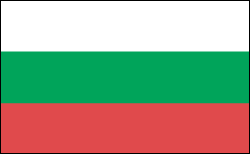Bulgaria History


Bulgaria's First Non-Communist Government Gains Power
A Soviet-style People's Republic was established in 1947 and Bulgaria acquired the reputation of being the most slavishly loyal to Moscow of all the East European Communist countries. The general secretary of the Bulgarian Communist Party, Todor Zhikov, resigned in 1989 after 35 years in power. His successor, Peter Mladenov, purged the Politburo, ended the Communist monopoly on power, and held free elections in May 1990 that led to a surprising victory for the Communist Party, renamed the Bulgarian Socialist Party (BSP). Mladenov was forced to resign in July 1990.
In Oct. 1991, the Union of Democratic Forces won, forming Bulgaria's first non-Communist government since 1946. Power shifted back and forth between the pro-Western Union of Democratic Forces (UDF) and the BSP during the 1990s. The economy continued to deteriorate amid growing concern over the spread of organized crime. A new UDF government, led by Prime Minister Ivan Kostov, was elected in 1997 to overhaul the economic system and institute reforms aimed at stemming corruption. Progress on both fronts remained slow. As a result, the UDF lost the July 2001 election to the former king of Bulgaria, leader of the Simeon II National Movement (SNM). The new prime minister, Simeon Saxe-Coburg-Gotha (Simeon II), had been dethroned 55 years earlier (at age nine) during the Communist takeover of the country. Bulgaria became a member of NATO in 2004. In 2005, the EU approved its membership for 2007, subject to the implementation of reforms, especially the cleaning up of corruption and organized crime.
In June 2005 general elections, no party received a clear majority, and a coalition government was formed with Socialist Party leader Sergei Stanishev as the new prime minister. In 2007, Bulgaria joined the EU.
On July 23, 2008, the European commission suspended about 500 million euros of EU aid to Bulgaria due to suspicion of organized crime and corruption.
A severe energy shortage for several weeks in January 2009 was caused by the Russian-Ukrainian gas dispute and created widespread anger towards government energy policies.







